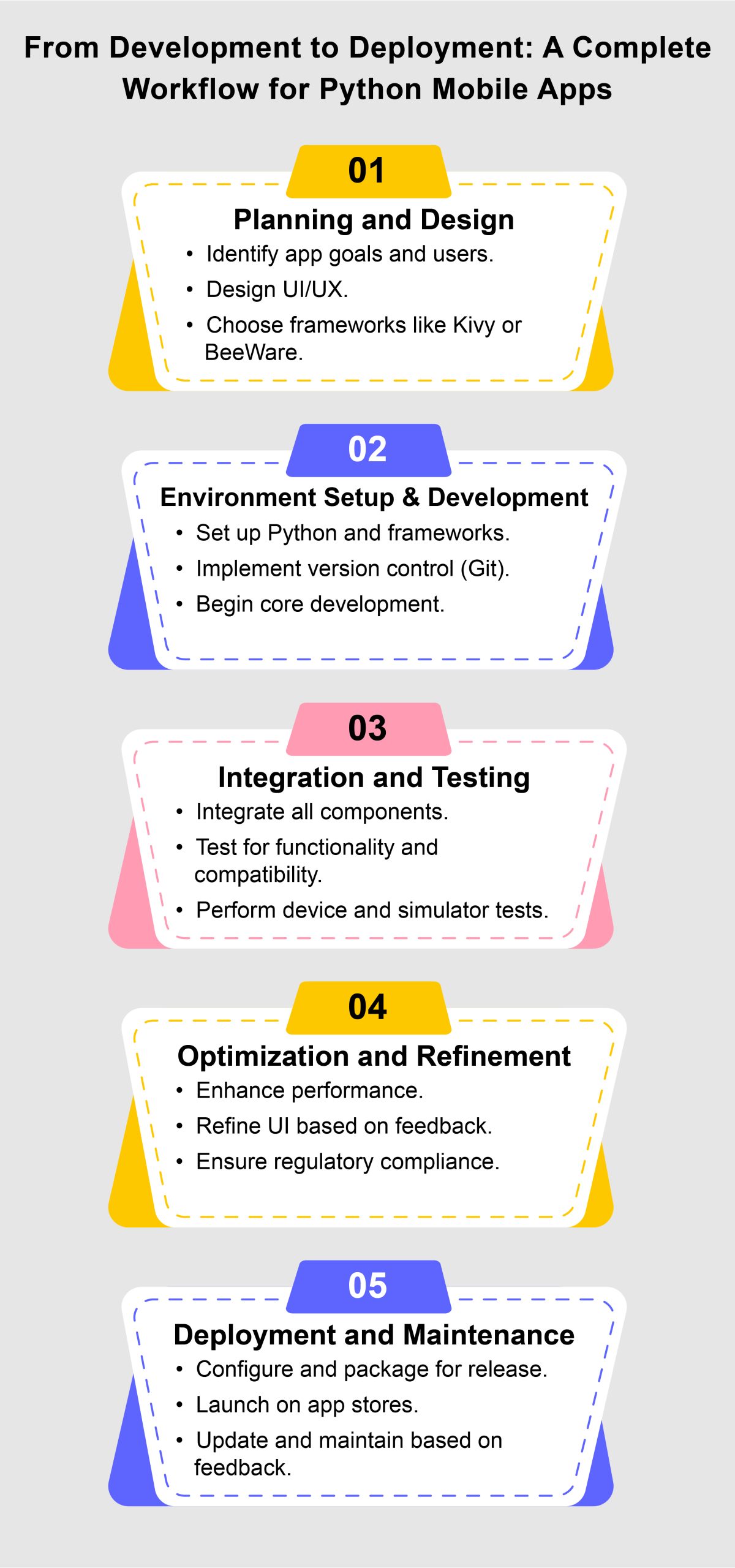Let's Get You Started

Let's Get You Started




Python is a dynamic, versatile language that’s revered in the industry of web development, data science, and automation. But what about python in mobile app development? As businesses pivot to mobile-first strategies, exploring how Python can play a pivotal role in this domain is crucial.
Python’s syntax is one of its most valuable assets – clean, easy to read, and concise. This simplicity allows developers to write less code than Java or C++, typically used for mobile app development. Writing less code means that the development process is quicker, and there are fewer chances for bugs, making the entire app creation process more streamlined.
Python in mobile app development is known for its flexibility. It integrates seamlessly with other languages and tools, making it an excellent choice for projects requiring cross-platform applications.
Python boasts a robust ecosystem of libraries and frameworks, such as Kivy and BeeWare, that can simplify many aspects of mobile app development. Moreover, a vibrant community backs these tools, ready to offer support and continuous updates.
While Python isn’t traditionally associated with mobile app development, several tools and frameworks make it possible:
These tools help overcome Python’s limitations in mobile environments, leveraging its strengths to create functional and responsive apps.

Python’s integration capabilities are a major asset. It often serves as a backend server or an API, while the front end may run on a more conventional mobile development environment. Here’s a snapshot of how Python in mobile app development fits into the mobile development ecosystem:
Developers can leverage cross-platform development tools such as Kivy and BeeWare to write their code once and effortlessly deploy it across multiple platforms. By implementing this solution, you can streamline your processes and ensure a seamless experience for users across various devices.
Python’s syntax and the extensive range of libraries available can significantly reduce the time it takes to develop applications. Due to this, it is a practical choice for startups and enterprises that need to deploy apps quickly.
Choosing the right programming language is crucial when venturing into mobile app development. While traditionally used for web and software development, Python app development has also carved a niche in mobile app development. However, it often competes with traditional mobile development languages like Swift for iOS and Kotlin for Android. Here, we’ll compare Python with these languages to help you decide based on your project’s needs.
Selecting between Python, Swift, or Kotlin largely depends on your specific project requirements:
Let’s explore the advantages and challenges of using Python for mobile app development.
| Aspect | Advantage | Challenge |
| Development Speed | High due to simple syntax | Slower runtime performance |
| Cost Efficiency | Reduced development costs | Potentially higher maintenance |
| Community Support | Extensive libraries and frameworks | Limited mobile-specific resources |
Can Python be used for professional mobile app development?
Yes, Python can be used for professional mobile app development, especially with frameworks like Kivy and BeeWare, which help create cross-platform apps.
Is Python suitable for Android and iOS apps?
Python is suitable for both platforms through frameworks that support cross-platform development. However, native Swift (iOS) or Kotlin (Android) development might be more efficient for accessing device-specific features.
What are the main benefits of using Python over other languages in mobile app development?
The main benefits include rapid development speed, cost efficiency, and the strong support of a vibrant community.
Are there any notable apps built with Python?
While specific examples are less common in the mobile space, Python is extensively used in web applications and can support mobile app backends effectively.
How do Python development companies contribute to mobile app development?
Python development companies often specialize in creating powerful backends and APIs that can drive mobile applications, enhancing their functionality and user experience.
Python is a prospect for mobile app development, even though it’s not the first language that comes to mind. With the help of powerful frameworks and tools, Python’s capabilities are noteworthy. Whether you’re a startup looking to quickly prototype an app or an enterprise needing a robust backend, Python’s advantages can be leveraged to enhance mobile app development. Remember, the right tools and a clear understanding of Python’s strengths and limitations are key to successfully integrating into your mobile development projects.

Welcome to Appxide, where innovation meets utility in the world of app development. Our mission is to craft cutting-edge digital solutions that simplify lives and spark connections. With a diverse portfolio that traverses multiple sectors, we are committed to excellence and user-centric design. Stay tuned to our blog for the latest in tech, insights, and the stories behind our projects. Dive into the future with us – where every app we create is a step towards the extraordinary.